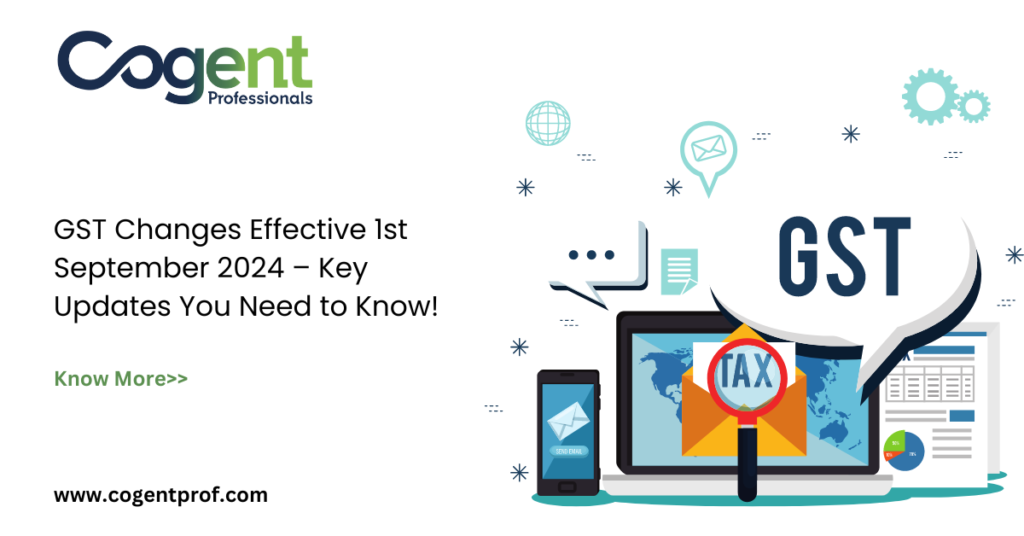Changes in GST Effective from 1st September 2024

Changes in GST Effective from 1st September 2024
The Goods and Services Tax (GST) landscape in India is continually evolving to enhance compliance and streamline processes for taxpayers. Starting 1st September 2024, several key changes have been implemented that will impact taxpayers across different sectors. Here’s a detailed look at the significant updates:
1. Reporting of High-Value Supplies in GSTR-1
From 1st September 2024, any supply with a value exceeding Rs. 1 lakh must be reported in Table B2CL of the GSTR-1 form. This change aims to improve the accuracy of reporting high-value transactions and ensure that the tax authorities have better oversight of large transactions.
Key Points:
- Applicable to all taxpayers filing GSTR-1.
- High-value supplies exceeding Rs. 1 lakh must be reported under Table B2CL.
- This measure is expected to enhance transparency and improve tax compliance.
2. Negative Liability Reporting in GSTR-3B
Taxpayers now have the option to report negative liability in Table 3 of the GSTR-3B return. This change will allow taxpayers to offset negative liabilities automatically in the subsequent month’s return, streamlining the reconciliation process and reducing manual adjustments.
Benefits:
- Simplifies the return filing process by automatically adjusting negative liabilities.
- Reduces manual reconciliation errors and enhances accuracy.
- Ensures a smoother filing experience for taxpayers by automatically carrying forward negative values.
3. Blocking of GSTR-1 / IFF for Non-Validation of Bank Details
To maintain the integrity of GST compliance, taxpayers who have not added and validated their bank account details in their GST registration will have their GSTR-1 or Invoice Furnishing Facility (IFF) blocked. This measure emphasizes the importance of updating bank account details to maintain compliance and ensure the smooth filing of returns.
Important Points:
- Bank account validation is mandatory for all GST-registered taxpayers.
- Failure to validate bank details will result in the blocking of GSTR-1 / IFF.
- Taxpayers are advised to verify and update their bank details promptly to avoid disruption in return filing.
4. Activation of GSTR-9 and GSTR-9C on the GST Portal
The annual return (GSTR-9) and reconciliation statement (GSTR-9C) forms are now active on the GST portal. This enables taxpayers to file their annual returns and reconciliation statements for the financial year 2023-24.
Key Aspects:
- GSTR-9 is mandatory for taxpayers with an annual turnover of more than Rs. 2 crore.
- GSTR-9C is required for taxpayers whose turnover exceeds Rs. 5 crore and includes a reconciliation statement between the audited financial statements and the annual return.
- Both forms must be filed within the prescribed timelines to avoid penalties.
Conclusion
These changes reflect the government’s ongoing efforts to enhance compliance and streamline GST processes. Taxpayers should take note of these updates and ensure timely adjustments in their compliance procedures to avoid any disruptions. Regularly reviewing the GST portal and staying updated with such changes will help businesses manage their tax obligations effectively.
About the Expert:
Mr. Butchibabu, Chartered Accountant, is a renowned expert in GST compliance and tax advisory services. With years of experience guiding businesses through the complexities of GST regulations, Mr. Butchibabu and his team are committed to helping you navigate these changes smoothly. For personalized assistance with your GST filings, feel free to reach out. Stay compliant and keep your tax processes smooth!




